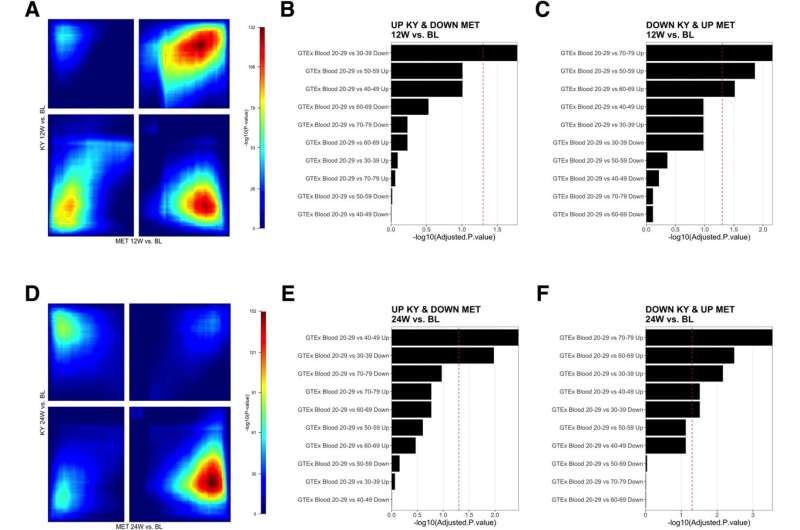This article has been reviewed according to Science X's editorial process and policies. Editors have highlighted the following attributes while ensuring the content's credibility:
fact-checked
peer-reviewed publication
trusted source
proofread
Yoga provides unique cognitive benefits to older women at risk of Alzheimer's disease, study finds

A new UCLA Health study found Kundalini yoga provided several benefits to cognition and memory for older women at risk of developing Alzheimer's disease, including restoring neural pathways, preventing brain matter decline, and reversing aging and inflammation-associated biomarkers—improvements not seen in a group who received standard memory training exercises.
The findings, published in the journal Translational Psychiatry, are the latest in a series of studies led by UCLA Health researchers over the past 15 years into the comparative effects of yoga and traditional memory enhancement training on slowing cognitive decline and addressing other risk factors of dementia.
Led by UCLA Health psychiatrist Dr. Helen Lavretsky of the Jane and Terry Semel Institute for Neuroscience and Human Behavior, this latest study sought to determine whether Kundalini yoga could be used early on to prevent cognitive decline and trajectories of Alzheimer's disease among postmenopausal women.
Women have about twice the risk of developing Alzheimer's disease compared to men due to several factors, including longer life expectancy, changes in estrogen levels during menopause, and genetics.
In the new study, a group of more than 60 women ages 50 and older who had self-reported memory issues and cerebrovascular risk factors were recruited from a UCLA cardiology clinic. The women were divided evenly into two groups. The first group participated in weekly Kundalini yoga sessions for 12 weeks, while the other group underwent weekly memory enhancement training during the same time period. Participants were also provided daily homework assignments.
Kundalini yoga is a method that focuses on meditation and breathwork more so than physical poses. Memory enhancement training developed by the UCLA Longevity Center includes a variety of exercises, such as using stories to remember items on a list or organizing items on a grocery list, to help preserve or improve the long-term memory of patients.
Researchers assessed the women's cognition, subjective memory, depression, and anxiety after the first 12 weeks and again 12 weeks later to determine how stable any improvements were. Blood samples were also taken to test for gene expression of aging markers and for molecules associated with inflammation, which are contributing factors to Alzheimer's disease. A handful of patients were also assessed with MRIs to study changes in brain matter.
Researchers found the Kundalini yoga group participants saw several improvements not experienced by the memory enhancement training group. These included significant improvement in subjective memory complaints, prevention of brain matter declines, increased connectivity in the hippocampus, which manages stress-related memories, and improvement in the peripheral cytokines and gene expression of anti-inflammatory and anti-aging molecules.
"That is what yoga is good for—to reduce stress, to improve brain health, subjective memory performance, and reduce inflammation and improve neuroplasticity," Lavretsky said.
Among the memory enhancement training group, the main improvements were found to be in the participants' long-term memory.
Neither group saw changes in anxiety, depression, stress or resilience, though Lavretsky stated this is likely because the participants were relatively healthy and were not depressed.
While the long-term effects of Kundalini yoga on preventing or delaying Alzheimer's disease require further study, Lavretsky said the study demonstrates that using yoga and memory training in tandem could provide more comprehensive benefits to the cognition of older women.
"Ideally, people should do both because they do train different parts of the brain and have different overall health effects," Lavretsky said. "Yoga has this anti-inflammatory, stress-reducing, anti-aging neuroplastic brain effect which would be complimentary to memory training."
More information: Adrienne Grzenda et al, Cognitive and immunological effects of yoga compared to memory training in older women at risk for alzheimer's disease, Translational Psychiatry (2024). DOI: 10.1038/s41398-024-02807-0





















